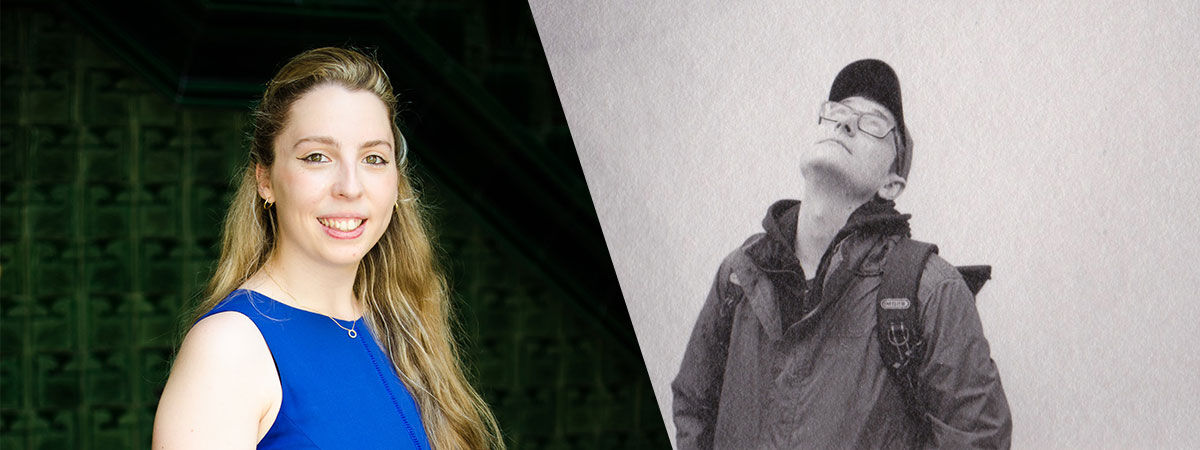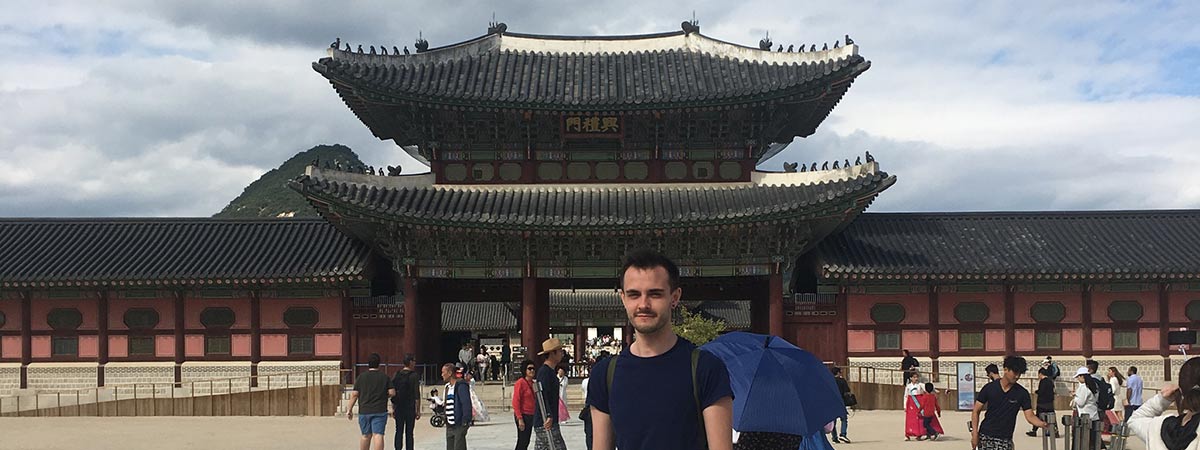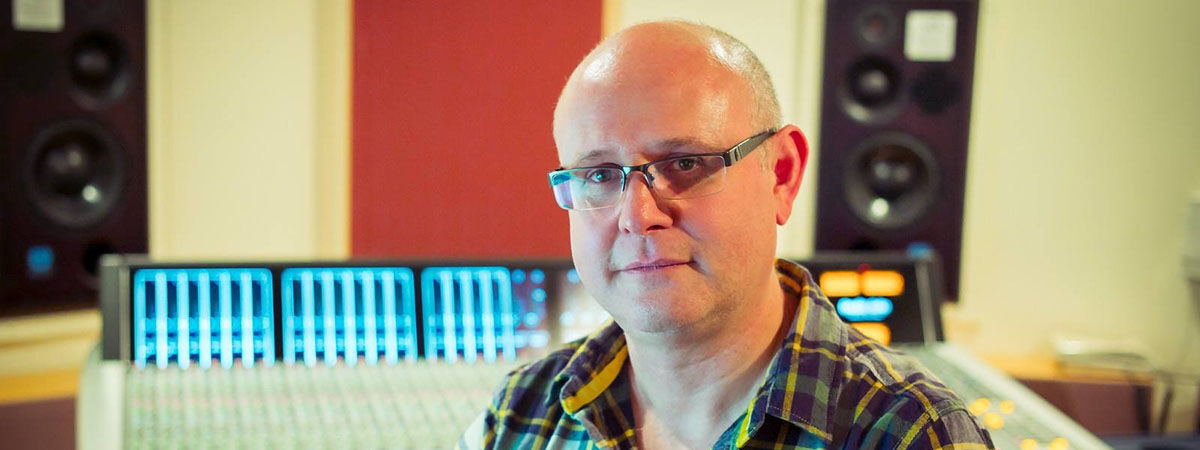Welcome to the third instalment of Passing The Baton – in which members of the RBC community interview each other.
Each week, a member of RBC staff or a student will interview a colleague to gain some insight into how the Coronavirus crisis has affected their life, both professionally and personally. The interviewer will then “pass the baton” to the interviewee who will go on to present their questions to the next person along, until finally closing the loop with an interview with our first interrogator.

This week, RBC Composition Tutor Andy Ingamells talks to Violin Tutor Caroline Pether.
Andy Ingamells (AI)
How are you finding life under lockdown? Are you managing to practice ok? Or are you doing other things during this time?
Caroline Pether (CP)
After a sad first week of lockdown when all my upcoming concerts were cancelled, I’ve since settled into a calm and positive rhythm of practice, various work responsibilities I still have including my teaching, and walks around my neighbourhood every few days. I read a fantastic Guardian article early on which really helped me to shape my routine.
In the article, a polar scientist, a monk, a submarine captain and a solo sailor all share their experiences. The tip that’s stuck with me most is definitely start a daily routine and make the weekends different. So I’ve started a Practice Club for RBC’s string students every weekday morning 10-12 where we all log into a Skype video call and mute ourselves. That way there isn’t a cacophony of everyone’s practice! (One day I forgot to mute myself and a student was treated to a few seconds of my sleepy Schradieck!) But I hope the students who’ve been joining have felt a sense of community. I’ve found it to be a great motivator personally because I’m responsible for the club so no matter what, I have to be in my music room ready to go at 10! Then when it comes to the weekend it feels great to put my feet up a bit and enjoy a G&T.
AI
How have your students been finding this strange new situation? Have you been able to adapt to teaching online?
CP
From chatting to students after Practice Club and after individual lessons, it's clear that they are having really different experiences of lockdown life. Living situations play a massive part; students who are staying in family homes or who live with friends are going to have a much more positive experience than those who live alone or with strangers. Many students are really missing those institutional environments that motivate and encourage focused study. Although others have said that they’re enjoying all this time to focus on technical issues they've been wanting to fix for ages hampered previously by busy schedules. So it's a real mixed bag. All we can do as staff members is to try to encourage and support them as best we can.
I've found a system with the online teaching that I'm happy with, which involves students sending video excerpts of their pieces prior to the lesson. That way I can hear a sound that's closer to the student’s true sound. Then we have a video call and discuss the lesson points as well as playing a few short examples. I am finding that the online teaching is a lot more tiring, I was talking to a friend about this recently and she said something that really resonated; it's much harder to pick up on the subtle emotional cues from your students that help you know what tone to strike in your feedback. But we are very fortunate to be in a technological age where it's even possible to still give lessons, so for that I'm grateful.
AI
How do you find inspiration during times like these?
CP
For me it comes in waves, I just try to listen to how I'm feeling and catch the inspiration 'peaks' when they happen. But that's the fantastic thing about practice, there are so many different types and there's often one that can match well with the emotional sphere you're in. Fellow VT Susanne Stanzeleit posted some encouraging words for the students recently to this effect and I whole-heartedly agree. When we're feeling low in inspiration then it might be a good time to practice something technical and repetitive. If we're feeling focused and inspired then this is a great time to think about harmony, interpretation, characters, stories, images, nature, sound-worlds etc. If we're low in mental energy but want to feed our love for music then playing through favourite repertoire without self-criticism is a really fun activity. I find this approach works really well for outside of the practice room too. Listening to recordings of the greats or reading The Strad magazine, for example, is great when we're at our most receptive. Podcasts are great as a break from music but still work the mind. And then we all need a bit of Netflix or sport to give ourselves that very important switch-off time!
AI
You are a member of lots of different ensembles and collectives. Are you managing to keep in touch with everyone? Have they had similar lockdown experiences to you?
CP
I’ve been able to stay in touch virtually with many friends and colleagues from my two orchestras Manchester Camerata and Sinfonia Cymru. It's been great to see how musicians are contributing to online content to keep these brilliant organisations' presence alive and it’s also moving to read messages dreaming up future concerts and talking of how we can't wait to play together again. We're crossing all our fingers and toes and praying all the prayers that these wonderful orchestras survive.
AI
Have you used this time to play any new repertoire? Perhaps something you’ve been putting off during normal life?
CP
I'm fortunate that two of my upcoming concerts have been postponed as opposed to cancelled; performances and a recording of Thomas Adès’s Piano Quintet, and a performance of Brahms’s Double with good friend and cellist extraordinaire Hannah Roberts, so I've been enjoying exploring and focusing on these works. One thing that's very easy to put off in 'normal' life is fixing bad technical habits; the conveyor-belt of learning new repertoire and concerts makes it hard to carve out space to really sort out that tense little finger for example! I've been practicing Schradieck to increase my left-hand agility, I've been gradually getting it faster every day. The aim is to reach 200bpm, I'm currently at 192bpm so let's see if I get there! I'm also enjoying studying many of the scales that I didn't do as a student. I used the Galamian scale book when I was younger but even in this book there are scales in unusual groupings or different arpeggio sequences and fingerings that I never explored. And that's without even mentioning the Carl Flesch book or Simon Fischer's more recent method! So there's lots to discover.
AI
What do you miss from life before the lockdown?
CP
I'm really missing chamber music, there is no satisfying equivalent using technology for me. Of course it’s amazing what we can do; I've done a few of these videos now where you record your part separately and then someone very clever puts it all together. It's amazing to see the final product. And there are so many other ways we can connect musically using technology such as sharing playlists and watching concerts online. But I've yet to discover a way to emulate that special moment when you're making music with another musician and there is some tiny, nuanced change in their sound that inspires you to react and have a musical conversation with them. I'm also really missing eating out. I enjoy cooking at home, but there are some meals I'll just never be able to do like they do in a restaurant (I'm a very average cook!). My wife is a vegetarian so we're not eating meat at home but I had a massive craving for a buttermilk fried chicken burger the other day!
AI
You recorded a CD of music by Nicholas Simpson. What other living composers have you listened to lately?
CP
I’ve always loved Thomas Adès’s Arcadiana and I’m currently finding the 6th movement ‘O Albion’ particularly comforting. Albion is a poetic name for Great Britain so when I listen to it in this time it feels like a gentle anthem of solidarity and an encouragement to come together as a society and help each other. I’ve also been listening to John Harbison’s Four Songs of Solitude for solo violin, there’s a stunning recording by Janine Jansen for anyone who wants to check them out.
AI
If we can look at this lockdown period in a positive light what do you think we can learn from it?
CP
I hope it will help us to be kinder to one another. I’m finding in all my conversations with people that there is not a single person who is not suffering in some way. It means I’m exercising my empathy antennae much more than usual. Many people are afraid, and rightly so, but I’m also noticing people who smile at me in the supermarket queue or make a joke about the strange dance we do in the aisles in order to socially distance ourselves! I hope for all of us that we’re able to carry this increased capacity for kindness and empathy forward into the future.
AI
What are you most looking forward to in the future?
CP
Playing wonderful music with my friends and colleagues again and sharing it with audiences.
Next week: Caroline interviews 2nd year MMus student, bass trombonist, Thomas Pilsbury.




